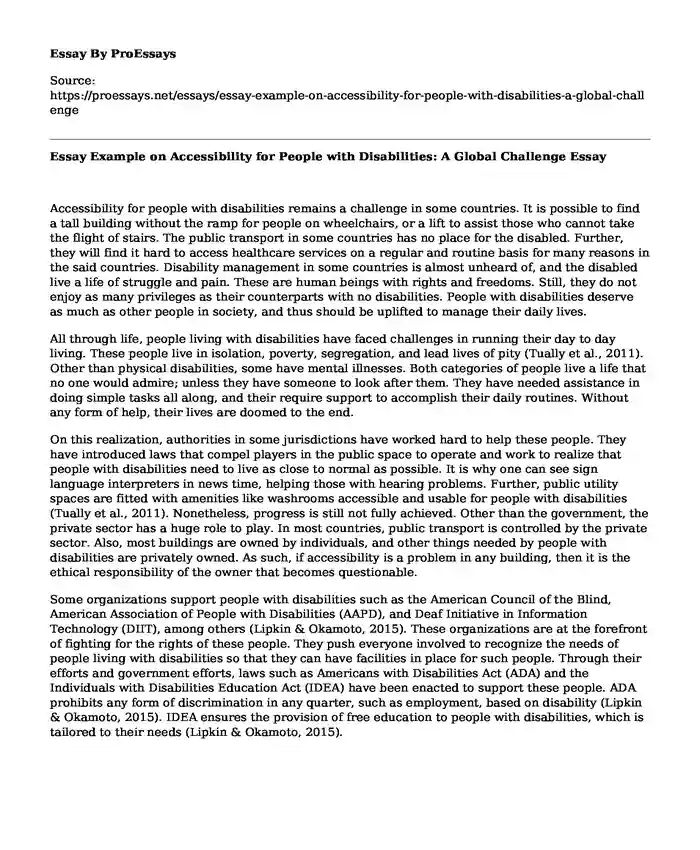Accessibility for people with disabilities remains a challenge in some countries. It is possible to find a tall building without the ramp for people on wheelchairs, or a lift to assist those who cannot take the flight of stairs. The public transport in some countries has no place for the disabled. Further, they will find it hard to access healthcare services on a regular and routine basis for many reasons in the said countries. Disability management in some countries is almost unheard of, and the disabled live a life of struggle and pain. These are human beings with rights and freedoms. Still, they do not enjoy as many privileges as their counterparts with no disabilities. People with disabilities deserve as much as other people in society, and thus should be uplifted to manage their daily lives.
All through life, people living with disabilities have faced challenges in running their day to day living. These people live in isolation, poverty, segregation, and lead lives of pity (Tually et al., 2011). Other than physical disabilities, some have mental illnesses. Both categories of people live a life that no one would admire; unless they have someone to look after them. They have needed assistance in doing simple tasks all along, and their require support to accomplish their daily routines. Without any form of help, their lives are doomed to the end.
On this realization, authorities in some jurisdictions have worked hard to help these people. They have introduced laws that compel players in the public space to operate and work to realize that people with disabilities need to live as close to normal as possible. It is why one can see sign language interpreters in news time, helping those with hearing problems. Further, public utility spaces are fitted with amenities like washrooms accessible and usable for people with disabilities (Tually et al., 2011). Nonetheless, progress is still not fully achieved. Other than the government, the private sector has a huge role to play. In most countries, public transport is controlled by the private sector. Also, most buildings are owned by individuals, and other things needed by people with disabilities are privately owned. As such, if accessibility is a problem in any building, then it is the ethical responsibility of the owner that becomes questionable.
Some organizations support people with disabilities such as the American Council of the Blind, American Association of People with Disabilities (AAPD), and Deaf Initiative in Information Technology (DIIT), among others (Lipkin & Okamoto, 2015). These organizations are at the forefront of fighting for the rights of these people. They push everyone involved to recognize the needs of people living with disabilities so that they can have facilities in place for such people. Through their efforts and government efforts, laws such as Americans with Disabilities Act (ADA) and the Individuals with Disabilities Education Act (IDEA) have been enacted to support these people. ADA prohibits any form of discrimination in any quarter, such as employment, based on disability (Lipkin & Okamoto, 2015). IDEA ensures the provision of free education to people with disabilities, which is tailored to their needs (Lipkin & Okamoto, 2015).
Conclusion
I believe that people with disabilities have been profoundly mistaken as people with inabilities for a long time. They need empowerment and unconditional acceptance in society to make them feel more appreciated and important. In the division of national resources, they need special consideration to uplift them to a level where they can operate with pride and distinction. Some disabled people like Stephen William Hawking have performed outstandingly, and they should be cited as an inspiration to the disabled people in society. Placing value on disabled people creates a conducive and humane society. They also feel more connected to the community and make their priceless contribution to social development and growth.
References
Lipkin, P., & Okamoto, J. (2015). The Individuals With Disabilities Education Act (IDEA) for Children With Special Educational Needs. PEDIATRICS, 136(6), e1650-e1662. https://doi.org/10.1542/peds.2015-3409
Tually, S., Beer, A., & McLoughlin, P. (2011). Housing assistance, social inclusion and people living with a disability (1st ed., p. Melbourne). Australian Housing and Urban Research Institute Southern Research Centre.
Cite this page
Essay Example on Accessibility for People with Disabilities: A Global Challenge. (2023, Sep 30). Retrieved from https://proessays.net/essays/essay-example-on-accessibility-for-people-with-disabilities-a-global-challenge
If you are the original author of this essay and no longer wish to have it published on the ProEssays website, please click below to request its removal:
- Essay Sample on Health Policy in the US
- Electronic Cigarettes Essay Example
- Fundamental Relationship Forms and Negotiation Paper Example
- Essay Sample on Unsettled World
- Essay Sample on Change from Pediatrics to Psychiatry: Reasons for a Career Shift
- Paper Example on Mild Hypothermia to Prevent Brain Damage After Cardiac Arrest
- Essay Example on HIPAA: Leveraging Privacy and Security of PHI in Healthcare







